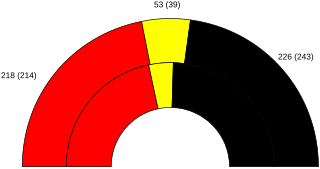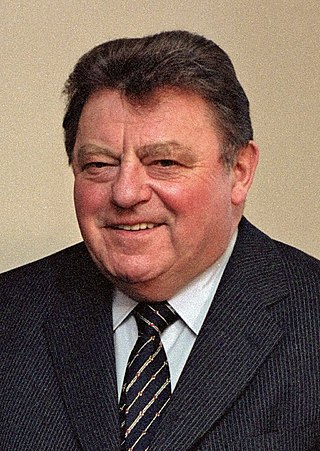1980 West German federal election
From Wikipedia, the free encyclopedia
Federal elections were held in West Germany on 5 October 1980 to elect the members of the 9th Bundestag. Although the CDU/CSU remained the largest faction in parliament, Helmut Schmidt of the Social Democratic Party remained Chancellor.
| |||||||||||||||||||||||||||||||||||||||||
All 497 seats in the Bundestag[a] 249 seats needed for a majority | |||||||||||||||||||||||||||||||||||||||||
|---|---|---|---|---|---|---|---|---|---|---|---|---|---|---|---|---|---|---|---|---|---|---|---|---|---|---|---|---|---|---|---|---|---|---|---|---|---|---|---|---|---|
| Registered | 43,231,741 2.8% | ||||||||||||||||||||||||||||||||||||||||
| Turnout | 38,292,176 (88.6%) 2.1 pp | ||||||||||||||||||||||||||||||||||||||||
| |||||||||||||||||||||||||||||||||||||||||
 The left side shows constituency winners of the election by their party colours. The right side shows party list winners of the election for the additional members by their party colours. | |||||||||||||||||||||||||||||||||||||||||
| |||||||||||||||||||||||||||||||||||||||||
Issues and campaign
Chancellor Helmut Schmidt of the SPD-FDP coalition wanted to be re-elected. The CDU/CSU candidate for Chancellor was CSU leader Franz Josef Strauß. It was the first time that their candidate was from the CSU. Strauß, immensely popular in Bavaria, found it difficult to appeal to people in other parts of Germany. One important reason for Strauss's unpopularity compared to Federal Chancellor Helmut Schmidt, was his tendency to talk sharply and militantly about his political opponents. Schmidt, by contrast, was still seen by many West German voters as a moderate and practical manager and doer, who focused on getting concrete political and economic results more than on political rhetoric.[1][2][3]
Results
 | ||||||||||||
|---|---|---|---|---|---|---|---|---|---|---|---|---|
| Party | Party-list | Constituency | Seats | |||||||||
| Votes | % | Seats | Votes | % | Seats | Elected | West Berlin | Total | +/– | |||
| Social Democratic Party | 16,260,677 | 42.86 | 91 | 16,808,861 | 44.46 | 127 | 218 | 10 | 228 | +4 | ||
| Christian Democratic Union | 12,989,200 | 34.24 | 93 | 13,467,207 | 35.62 | 81 | 174 | 11 | 185 | –16 | ||
| Free Democratic Party | 4,030,999 | 10.62 | 53 | 2,720,480 | 7.20 | 0 | 53 | 1 | 54 | +14 | ||
| Christian Social Union | 3,908,459 | 10.30 | 12 | 3,941,365 | 10.43 | 40 | 52 | 0 | 52 | –1 | ||
| The Greens | 569,589 | 1.50 | 0 | 732,619 | 1.94 | 0 | 0 | 0 | 0 | New | ||
| German Communist Party | 71,600 | 0.19 | 0 | 107,158 | 0.28 | 0 | 0 | 0 | 0 | 0 | ||
| National Democratic Party | 68,096 | 0.18 | 0 | 0 | 0 | 0 | 0 | |||||
| Citizens' Party | 11,256 | 0.03 | 0 | 507 | 0.00 | 0 | 0 | 0 | 0 | New | ||
| People's Front Against Reaction, Fascism and War | 9,319 | 0.02 | 0 | 7,160 | 0.02 | 0 | 0 | 0 | 0 | New | ||
| Communist League of West Germany | 8,174 | 0.02 | 0 | 12,008 | 0.03 | 0 | 0 | 0 | 0 | 0 | ||
| European Workers' Party | 7,666 | 0.02 | 0 | 4,992 | 0.01 | 0 | 0 | 0 | 0 | 0 | ||
| Christian Bavarian People's Party | 3,946 | 0.01 | 0 | 0 | 0 | 0 | 0 | |||||
| German Union | 421 | 0.00 | 0 | 0 | 0 | 0 | New | |||||
| Independent Workers' Party | 159 | 0.00 | 0 | 0 | 0 | 0 | 0 | |||||
| German Freedom Party | 96 | 0.00 | 0 | 0 | 0 | 0 | New | |||||
| Independents and voter groups | 3,498 | 0.01 | 0 | 0 | 0 | 0 | 0 | |||||
| Total | 37,938,981 | 100.00 | 249 | 37,806,531 | 100.00 | 248 | 497 | 22 | 519 | +1 | ||
| Valid votes | 37,938,981 | 99.08 | 37,806,531 | 98.73 | ||||||||
| Invalid/blank votes | 353,115 | 0.92 | 485,645 | 1.27 | ||||||||
| Total votes | 38,292,096 | 100.00 | 38,292,176 | 100.00 | ||||||||
| Registered voters/turnout | 43,231,741 | 88.57 | 43,231,741 | 88.57 | ||||||||
| Source: Bundeswahlleiter | ||||||||||||

Results by state
Constituency seats
| State | Total seats |
Seats won | ||
|---|---|---|---|---|
| SPD | CDU | CSU | ||
| Baden-Württemberg | 37 | 6 | 31 | |
| Bavaria | 45 | 5 | 40 | |
| Bremen | 3 | 3 | ||
| Hamburg | 7 | 7 | ||
| Hesse | 22 | 19 | 3 | |
| Lower Saxony | 31 | 23 | 8 | |
| North Rhine-Westphalia | 71 | 44 | 27 | |
| Rhineland-Palatinate | 16 | 6 | 10 | |
| Saarland | 5 | 3 | 2 | |
| Schleswig-Holstein | 11 | 11 | ||
| Total | 248 | 127 | 81 | 40 |
List seats
| State | Total seats |
Seats won | |||
|---|---|---|---|---|---|
| CDU | SPD | FDP | CSU | ||
| Baden-Württemberg | 35 | 5 | 21 | 9 | |
| Bavaria | 44 | 25 | 7 | 12 | |
| Bremen | 1 | 1 | |||
| Hamburg | 6 | 4 | 2 | ||
| Hesse | 24 | 16 | 3 | 5 | |
| Lower Saxony | 32 | 18 | 7 | 7 | |
| North Rhine-Westphalia | 76 | 33 | 26 | 17 | |
| Rhineland-Palatinate | 16 | 5 | 8 | 3 | |
| Saarland | 3 | 2 | 1 | ||
| Schleswig-Holstein | 12 | 9 | 3 | ||
| Total | 249 | 93 | 91 | 53 | 12 |
Post-election
The coalition between the SPD and the FDP returned to government, with Helmut Schmidt as Chancellor. In 1982, the FDP quit the government, which led to the government's collapse and replacement with a new CDU/CSU – FDP coalition under Helmut Kohl.
Notes
Wikimedia Commons has media related to 1980 Germany Bundestagswahl.
- As well as the 22 non-voting delegates for West Berlin, elected by the West Berlin Legislature.
- As well as 11 non-voting delegates for West Berlin.
- As well as 10 non-voting delegates for West Berlin.
- As well as 1 non-voting delegate for West Berlin.
References
Sources
Wikiwand - on
Seamless Wikipedia browsing. On steroids.



